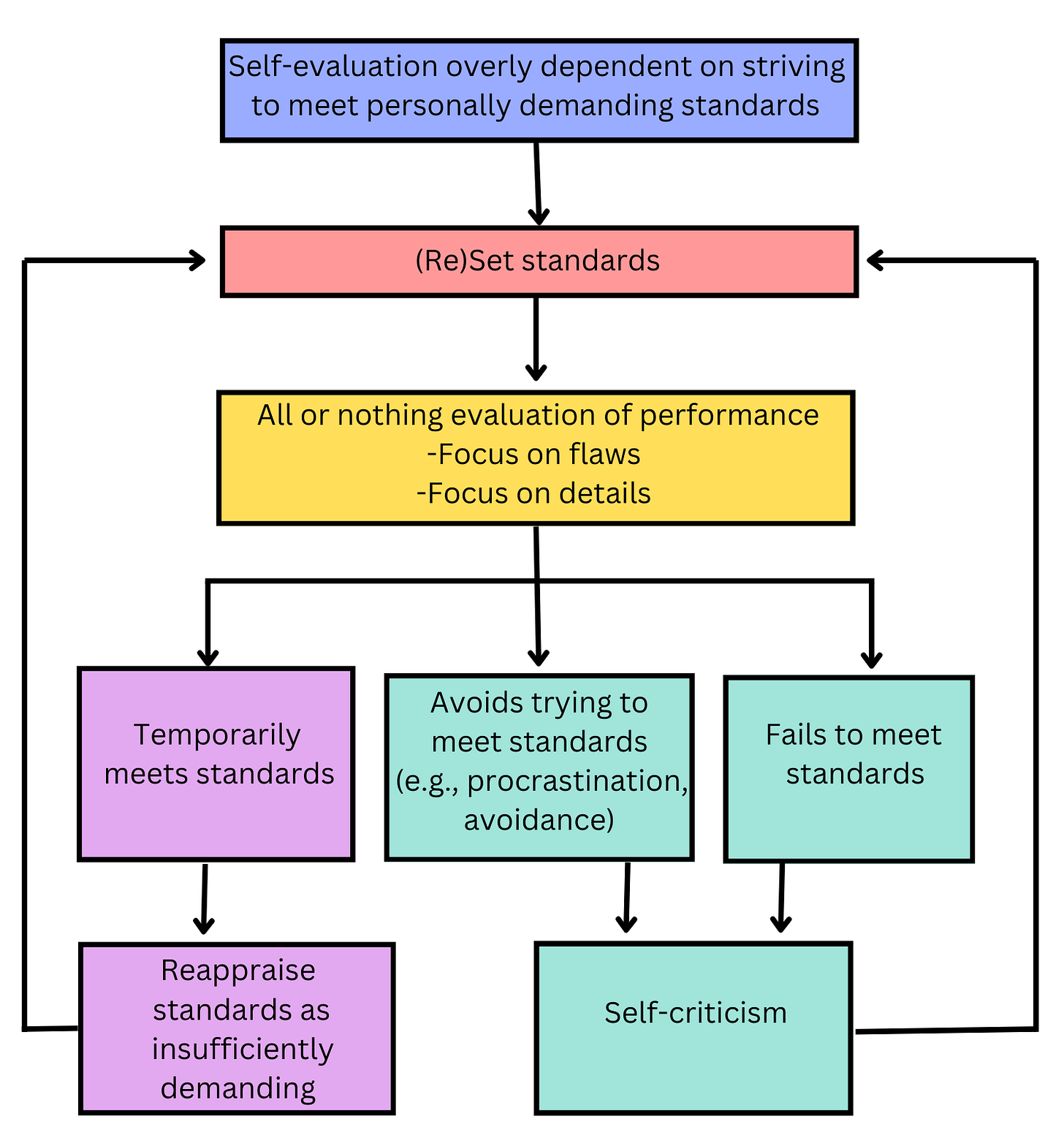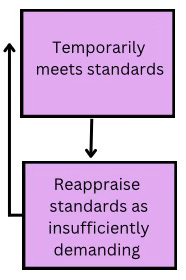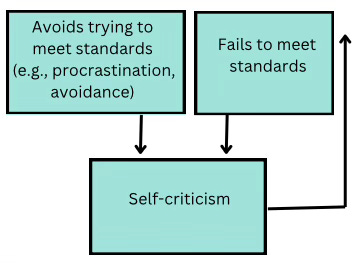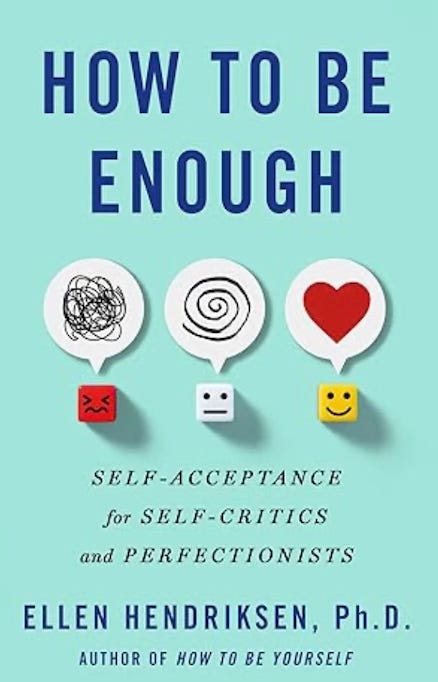Your Inner Critic, explained in one flowchart
You may say, “Hey, that’s what I do.”
Hi everyone!
This week, let’s get back to basics. This Substack newsletter, How to Be Good to Yourself When You’re Hard on Yourself, is for all of us who are our own worst critics.
If that sounds like you, you probably hear these phrases on a regular basis (read these in a sing-song voice): “Remember, done is better than perfect.” “Don’t let perfect be the enemy of good.” “You’re SO hard on yourself.” “You should really lower your standards.”
This week, let’s look at what exactly we’re doing to elicit these well-meaning but sometimes irritating comments.
This is a model of perfectionism based on the groundbreaking work of Drs. Roz Sharon, Zafra Cooper, and Christopher Fairburn when they were colleagues at Oxford University.
First, here’s the overall flow of perfectionism. Take a look, and then we’ll break it down step-by-step.
Ready? Let’s break it down, starting at the top!
We’ll start strong with the most important part: overevaluation.
In plain English, this means how we judge ourselves is contingent upon meeting our own extremely high personal standards.
It’s called over-evaluation because our evaluation of our performance (e.g., I got an A+—that’s good; I told a joke that no one got—that’s bad) overextends beyond the performance itself and becomes an evaluation of us as a person (e.g., I got an A+—I’m good; I told a joke no one got—I’m bad).
Next, we set personally demanding standards.
This might be something measurable and objective, like a 4.0 GPA, or something more nebulous, like “eating healthy.” Whatever standards we set for ourselves, they’re both effortful and a test of our character.
Next, we see how we did. But we stack the deck against ourselves in a couple ways.
First, we evaluate our performance as all-or-nothing—nothing in between. Plus, the criteria for success is very narrow; we set the standard for “adequate” at “flawless.” But that means it’s so difficult to achieve “all,” that we usually find ourselves at “nothing.”
Second, we focus on flaws and details. We might have six As and one B+, or follow our rules of healthy eating all day long except for one cookie, but the B+ or the cookie is what we focus on, and puts us at “nothing.” The other As and all the other healthy food doesn’t count. Zero tolerance.
Now, sometimes, just sometimes, we pull out all the stops and meet our personally demanding standards!
But then? We decide those standards weren’t demanding enough, and we follow the arrow on the left back up to (Re)set standards.
We got all A’s? Now we have to do it again next semester, too, and maybe take another AP class while we’re at it. We stuck to healthy eating? Well, now we should really start tracking our macros.
But more often, we find ourselves here:
We might get intimidated or paralyzed, so we don’t even try. We avoid. We procrastinate, delegate, numb out, or devalue the goal: “I didn’t even want that, anyway.”
Or, we fail. For our purposes, we’ll define failure as “not meeting expectations.” Therefore, we fail quite a bit, not because we’re not capable, but because our standards are unrealistic or rigid.
Both of these options lead us to that old familiar habit: self-criticism, which can look like:
Labeling: “I’m a hot mess.” “I’m am so stupid”
Rhetorical questions: “Why can’t I do this?” “What’s wrong with me?”
Should statements: “I should be able to do this.” “I should have known better.”
Comparison: “Everyone else has it together.”
And many, many more.
Regardless, then we follow the arrow back up to (Re)Set Standards.
And round and round we go.
What to do if you saw yourself in this chart? Well, you’re in the right place. Reducing suffering and increasing connection and self-acceptance is the driving force behind every newsletter here at How to Be Good to Yourself When You’re Hard on Yourself, so grab a snack and click around. If you’re new(ish) here, here are some greatest hits you may enjoy.
▶️ Why do I feel awkward in groups—even with people I love?
▶️ Maybe it’s not you: 4 signs your anxiety is a sign of something else.
▶️ How to handle chronic dissatisfaction
▶️ Three concrete ways to grow your self-acceptance
▶️ How to stop overthinking social interactions
What would you like to hear about next? Requests are, as always, open in the comments!
While you’re at it, share How to Be Good to Yourself When You’re Hard on Yourself with a friend! Hey, there’s a button right there:
Be kind to others and yourself,











Topics I struggle with that you could probably shed light on:
-How to deal with anxiety about stupid video calls/cameras like Marco Polo or Zoom. I only Marco with one friend because it's her favorite way to connect but I have to face down my anxiety every time and it's getting old. I tried putting a sticky note on the screen so I couldn't see my face 😆 but I still feel daunted by what feels like a soliloquy performance.
-Anxiety about anxiety; sometimes I'd like to share my experiences with people who could possibly benefit, or ask for advice, but I feel embarrassed about my anxiety.
How can I trouble shoot this self flagellation? I have listened to tons of psychology things and am quite self aware where my thoughts are being created from.
Hard Choices Easy Life, Easy Choices Hard Life sums a lot about what goes for everyone's life. I myself am self aware that the life I am living is on total automation, there is no autonomous decision making I hold for myself as I didn't move outside my parent's house, which leads to they generally have a say in everything which is kind of default for their generation. A ruckus get created everyday for small bit of things which impacts everybody's day both in personal and professional which leads to a lot of stress and anxiety leading to poor focus & effort allocation throughout the whole day leading to mediocre efforts which will lead to mediocre or no result in the future.
I have said to myself that I need to move out from here, it will good for my personal growth, professionally as well and good for my family's overall health as well. I don't want to be dictated by my family in my 30's, when will I develop the skill of decision making the. I see almost 99% of people are living superficial lives even with their partners, they are not blunt about they want to speak or be who they are. Decisions are being made everywhere in some kind of peer pressure, even when I see they say we love each other a lot but then I see their decisions where the pressure gets seen mounted by one partner on the other. We are not living, our bodies are alive. Till date I haven't been around a human who has the skill of extreme ownership meaning they take onus of everything in their lives, I am surrounded by people blaming other people, government, their extended family for some or the other thing. And I see myself being turned into that over the last 27 years I have been alive, from the last couple of months I have changed every bit of narration that goes in my mind where I say to my parents that because of you people I had to pursue law and now I am doomed. But now I flipped the script, I take ownership & accountability of almost everything, I blame myself because I need to develop this skill to improve my life right now and for the upcoming times as well. Blaming others won't ever help me, in every situation if we think deeply we could have done better in that circumstance if we had the decision making skill. I don't see around me people with rational decision making skills as well.
I could surrender right now and say to myself that fuck everything and join your father's business. But I am revolting against my life because I know it as easy decision to join the business but only in the present. If I look it from ten thousand foot view, I know this is not what I want. I have to stand up for myself and take decisions that I want to and not what other people expect of me.
My personal perspective about everything seems different. My parents don't understand and I have a rift about almost everything when we sit together. And they keep on saying you haven't done anything successfully till date, you better shut the fuck up and don't teach us what is better in our lives and many other things. All of this has led to I feel like I should not take for any kind of help from anyone and I a big time fraud which I know is just a construct in my mind and not a reality.
I belong to a collective family so here is a notion that our parents give everything to their children in terms of house, assets, gold and many other things as well. Now I feel like I don't want anything from them even though I have to struggle in the long term to build wealth on my own terms. Down the line, when I will be 45 or 50 I can't live in their house as my internal monologue will say this isn't your house as you haven't done anything, this is your father's hardwork. My other friends are presently living in their parent's house but they don't feel like this. I don't how to extract this from my cognition as all of these things are creating a ruckus in mind mentally and emotionally which is leading to mediocre productivity as well while doing anything.